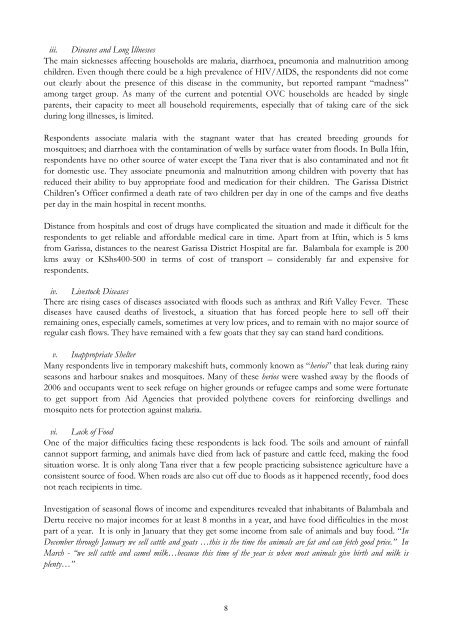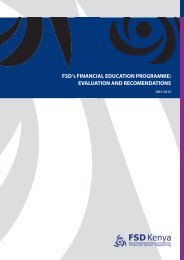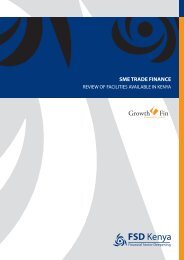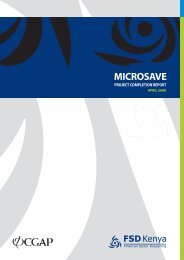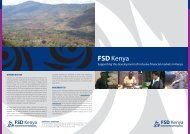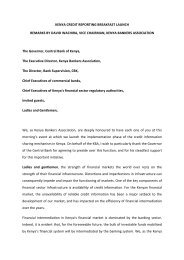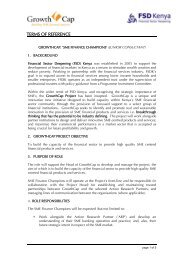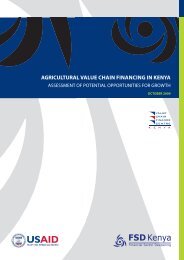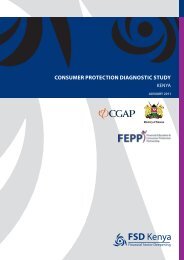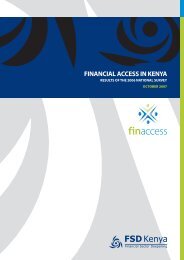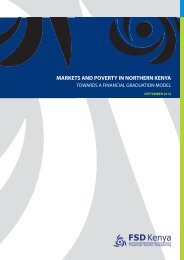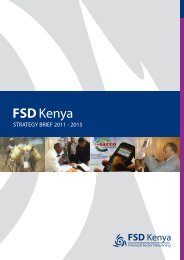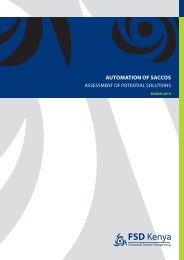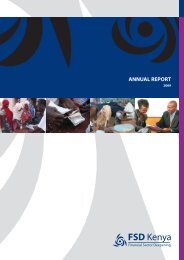FINAL REPORT - FSD Kenya
FINAL REPORT - FSD Kenya
FINAL REPORT - FSD Kenya
You also want an ePaper? Increase the reach of your titles
YUMPU automatically turns print PDFs into web optimized ePapers that Google loves.
iii. Diseases and Long Illnesses<br />
The main sicknesses affecting households are malaria, diarrhoea, pneumonia and malnutrition among<br />
children. Even though there could be a high prevalence of HIV/AIDS, the respondents did not come<br />
out clearly about the presence of this disease in the community, but reported rampant “madness”<br />
among target group. As many of the current and potential OVC households are headed by single<br />
parents, their capacity to meet all household requirements, especially that of taking care of the sick<br />
during long illnesses, is limited.<br />
Respondents associate malaria with the stagnant water that has created breeding grounds for<br />
mosquitoes; and diarrhoea with the contamination of wells by surface water from floods. In Bulla Iftin,<br />
respondents have no other source of water except the Tana river that is also contaminated and not fit<br />
for domestic use. They associate pneumonia and malnutrition among children with poverty that has<br />
reduced their ability to buy appropriate food and medication for their children. The Garissa District<br />
Children’s Officer confirmed a death rate of two children per day in one of the camps and five deaths<br />
per day in the main hospital in recent months.<br />
Distance from hospitals and cost of drugs have complicated the situation and made it difficult for the<br />
respondents to get reliable and affordable medical care in time. Apart from at Iftin, which is 5 kms<br />
from Garissa, distances to the nearest Garissa District Hospital are far. Balambala for example is 200<br />
kms away or KShs400-500 in terms of cost of transport – considerably far and expensive for<br />
respondents.<br />
iv. Livestock Diseases<br />
There are rising cases of diseases associated with floods such as anthrax and Rift Valley Fever. These<br />
diseases have caused deaths of livestock, a situation that has forced people here to sell off their<br />
remaining ones, especially camels, sometimes at very low prices, and to remain with no major source of<br />
regular cash flows. They have remained with a few goats that they say can stand hard conditions.<br />
v. Inappropriate Shelter<br />
Many respondents live in temporary makeshift huts, commonly known as “herios” that leak during rainy<br />
seasons and harbour snakes and mosquitoes. Many of these herios were washed away by the floods of<br />
2006 and occupants went to seek refuge on higher grounds or refugee camps and some were fortunate<br />
to get support from Aid Agencies that provided polythene covers for reinforcing dwellings and<br />
mosquito nets for protection against malaria.<br />
vi. Lack of Food<br />
One of the major difficulties facing these respondents is lack food. The soils and amount of rainfall<br />
cannot support farming, and animals have died from lack of pasture and cattle feed, making the food<br />
situation worse. It is only along Tana river that a few people practicing subsistence agriculture have a<br />
consistent source of food. When roads are also cut off due to floods as it happened recently, food does<br />
not reach recipients in time.<br />
Investigation of seasonal flows of income and expenditures revealed that inhabitants of Balambala and<br />
Dertu receive no major incomes for at least 8 months in a year, and have food difficulties in the most<br />
part of a year. It is only in January that they get some income from sale of animals and buy food. “In<br />
December through January we sell cattle and goats …this is the time the animals are fat and can fetch good price.” In<br />
March - “we sell cattle and camel milk…because this time of the year is when most animals give birth and milk is<br />
plenty…”<br />
8


